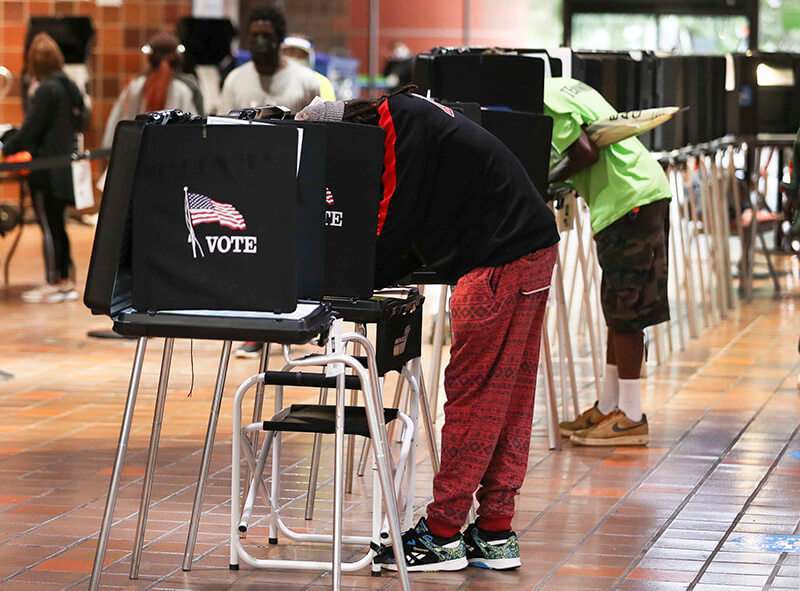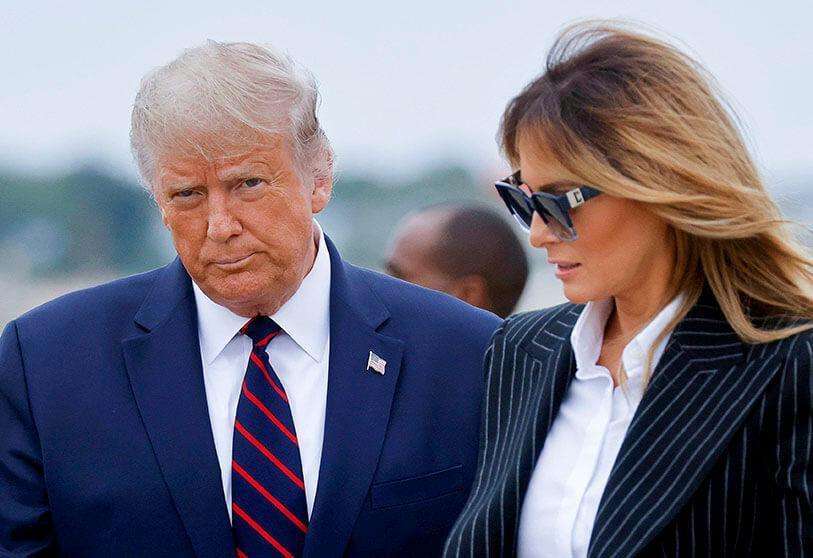Joe Biden is presented as the new president of the United States

With almost 99 percent of the votes counted in some states, the media are being cautious and do not wish to pre-empt events, even though the margin may vary very little.
As a result, the Democratic candidate for the White House, Joe Biden, did not wish to wait any longer. This Friday, as the fourth night of voting in the United States advanced, the former vice-president of the Barack Obama Administration (2009-2017) told all Americans that he would achieve a "clear and resounding victory".
In many places they have already begun to celebrate his victory and that of Kamala Harris, a politician and lawyer who will become the first woman to become Vice-President of the United States. Both have announced that they have already started working for the country. "While we await the final results, we are not waiting to start working," Biden added in a brief speech from Wilington, Delaware.
The Democrat reviewed the updated election data that are very favourable to him and said he will win the election because "the numbers are clear". The Democrats currently have 253 incumbents, compared to 213 Republicans who favored Donald Trump.
In a completely opposite tone to Trump, who has been denouncing alleged election fraud without evidence for days, Biden said that the "purpose of politics should not be an unrelenting war that seeks to inflame the conflict in order to solve the problems".
The count continues and Biden is aware, but the figures are beginning to adjust and the Democrat's victory is becoming clearer. "Your vote will be counted. I don't care how hard people try to stop it. I won't let it happen. The people will be heard," Biden pledged in the face of the Trump campaign's legal attempts to obstruct the vote count and invalidate votes.
Because of the coronavirus pandemic many Americans have preferred to vote by mail rather than go to the polls. This has caused an avalanche of votes that are taking a long time to be counted and recounted.
The vote count in the key states of Pennsylvania, Georgia, Arizona and Nevada, while appearing to be favourable to Biden, is slower than expected and very tight, so it is not known when the official winner of the election and the number of pledges will be known.
Pennsylvania is the most coveted prize because it has 20 delegates in the Electoral College, so if Biden wins in this state he would automatically become President. In the U.S. system, the candidate who reaches 270 delegates in the Electoral College, a body composed of 538 pledges contributed by all states based on their population, wins.

Joe Biden totals 264 delegates or 253, depending on whether Arizona is taken into account or not, where some media have not yet projected their victory there, which others did on election night such as the AP agency and Fox News; while Trump has 214.
Trump won a 750,000 vote margin in Pennsylvania on Tuesday night, but that advantage has been eroded as mail ballots were counted, a mode that Democrats have used more often in these elections to avoid crowding in the context of the pandemic.
Looking at the states where the count is taking place, Biden is ahead in Pennsylvania with 49.6% of the vote as opposed to 49.1% for Trump, with 95% of the vote counted.
He also leads in Georgia (16 delegates in the Electoral College), with 49.4 percent of the vote as opposed to 49.3 percent for the incumbent, with 99 percent counted; in Nevada (6 incumbents), he leads with 49.8 percent as opposed to 48 percent for the incumbent, with 92 percent counted; and in Arizona (11 delegates), he leads with 49.6 percent of the vote as opposed to 48.7 percent for Trump, with 95 percent counted.
In Georgia, they have already announced that they will have to recount the votes due to the tight result separating the candidates. However, Biden does not need to win in Georgia to get the 270 delegates to the Electoral College required to secure the White House: if he wins in Pennsylvania, where he also has a lead, he would already have 284, according to mainstream media projections.
President Trump leads in North Carolina (15 delegates) with 50% of the vote as opposed to 48.6% for Biden, when 97% were counted; and in Alaska (3 delegates) with 62.9% as opposed to 33% for the Democrat, and 46% of the votes counted

These elections have served to weaken the position of the Democrats in the House of Representatives, where they are reducing their advantage, and have left open until January the question of who will dominate the Senate, currently in the hands of the Republicans, while the ballot count continues.
Pending the completion of the vote, the provisional results offer these four keys to the future of Congress: the balance of power in the Senate will not be decided until 5 January, the Democrats will emerge weakened, there will be more internal polarisation and more representation of minorities with congressmen from Black Lives Matters and Qanon.
The distribution of the Senate will not be decided until 5 January, when the second round of voting for the two seats held by the state of Georgia will take place, as neither of the candidates received 50 percent of the votes, according to the projections of the major media.
Georgia, traditionally a conservative state, has gained unexpected prominence in these elections as it will probably decide which party will dominate the Senate and has furthermore given impetus to the Democratic presidential candidate, Joe Biden, who is leading the count in that state pending the final results.
At present, the vote count shows a technical tie with 48 of the 100 Senate seats for the Democrats and a further 48 for the Republicans, although it is expected that the latter will score a victory in North Carolina and another in Alaska, which would enable them to take 50 seats.
Everything therefore depends on these two January elections in Georgia, which is still a conservative state and where the Republicans have hope of winning. However, if the Democrats win Georgia's two seats, they would be tied at 50 with the Republicans.
Another major picture of Congress is that the Democrats will be weakened, with polls predicting that the Democrats would expand their majority in the House of Representatives, and even venturing that they could take the Senate away from the Republicans.
But the results are worse than expected and, in fact, mainstream media projections show that the Republicans have managed to snatch eight seats from the progressives, while the Democrats have taken only three from their opponents.
For the moment, the count gives 213 seats to the Democrats and 194 to the Republicans, while 28 are still in play. The House of Representatives is made up of 435 legislators and 218 are needed to be the party in the majority and with the most power, a position that the progressives seem to be holding.
Furthermore, from January the House of Representatives will be attended by Republican Marjorie Taylor Greene, the first congresswoman to openly join the QAnon movement, which promotes conspiracy theories and has been labelled by the FBI as a potential threat of domestic terrorism.
In response, Democrat Cori Bush became the first activist from the "Black Lives Matter" movement to reach the U.S. Congress, after a year marked by protests led by that group against racism and police brutality.

Since the closing of the polls in the United States, Donald Trump has carried out all kinds of strategies to gain media attention. First he announced that he was going to win while denouncing the election as a fraud. He tried to stop the vote count in Michigan and, as the results came out in favour of Biden, he began a campaign to discredit the American electoral system.
Such has been the commotion that some of the main US television stations, such as ABC, CBS and NBC, have cut Trump's speech in unison during prime time, while Fox News, the news reference of the Republican Party, contradicted his words.
The rift in the conservative news channel is getting deeper each time Trump repeats his accusations of election fraud. "We haven't seen anything that constitutes fraud or abuse of the system," said White House correspondent for Fox News John Roberts, speaking live from the same press room where the president had spoken seconds earlier.
The US president on Friday clung to the legal route to re-election as his chances of winning were reduced, and again questioned without evidence "the integrity of the entire electoral process" in his country.
The statements issued by the President on Friday make clear his position: "I will never stop fighting for you and for our country", he said in a statement distributed by his campaign.
Until Thursday, Trump's campaign insisted that the president still had options for re-election through the ballot in key states where everything is tight, but the president's statement seemed to confirm that they have already abandoned that idea.
Hours after Democratic candidate Joe Biden snatched the lead from him in Pennsylvania and Georgia, his statements have focused only on the legal battle and his accusations without evidence of fraud.
Trump has no intention of accepting a possible defeat and has not prepared a concession speech in case the media projections give victory to his Democratic rival. Concession speeches are a tradition in the United States, but are not required by law in the country, so they would not be necessary to certify a potential victory for Biden.
According to CNN, the president's allies, including his chief of staff Mark Meadows, have not tried to help Trump understand what is happening and continue to feed his accusations without proof that they are stealing the election.
The factor that most worries experts is not so much the possibility that Trump will refuse to acknowledge victory, but the possibility that the legal challenges presented by his campaign in several key states will prolong the uncertainty over the final result.
The state authorities have until 8 December to settle any disputes that may arise over the election of their Electoral College pledges, and on 14 December its members meet in their states and formally vote for the president, a vote that is to be endorsed by Congress on 6 January.

The road to Trump's re-election is increasingly narrow and necessarily passes through Pennsylvania, without whose 20 Electoral College votes it will be impossible for him to secure a second term in the White House.
With just 214 delegates secured out of the 270 he needs to win the election, Trump's campaign seemed resigned on Friday to the fact that he will not be able to secure a victory through the vote count that continues in several key states.
The campaign is now confident that the demands it has made to challenge the vote count in four hinge states will bear some significant fruit, something that has not happened so far, or that there will be recounts in several of those territories that will turn the electoral map upside down.
"We will continue this process through all aspects of the law," Trump said in a statement on Friday. What is clear is that, based on the current count, Trump will not be able to win unless he prevails in Pennsylvania, where he was snatched away from the lead by his Democratic rival on Friday.
Even if he wins the other three key states still in play - Georgia, Nevada and North Carolina - and turns things around in Arizona, which is unlikely given the trend in the remaining votes to be counted, Trump would still be five delegates short of the magic 270.
The other way would be for the demands he has filed to invalidate a large volume of votes in several key states, which is also unlikely because for now his litigation has failed to stop the count.
However, there is still much uncertainty about the future of the legal battle, and the outlook became even more complex when Georgia confirmed this Friday that it will recount the votes, something that could also happen in Pennsylvania.
Even so, Trump has so far secured seven million more votes than in 2016, with at least 69.9 million ballots, while Biden is ahead by over four million, with over 74 million.
Both have broken the record held so far by Barack Obama as the presidential candidate with the greatest support in terms of the popular vote in the history of the United States, which the former president set in 2008 with 69.5 million.








